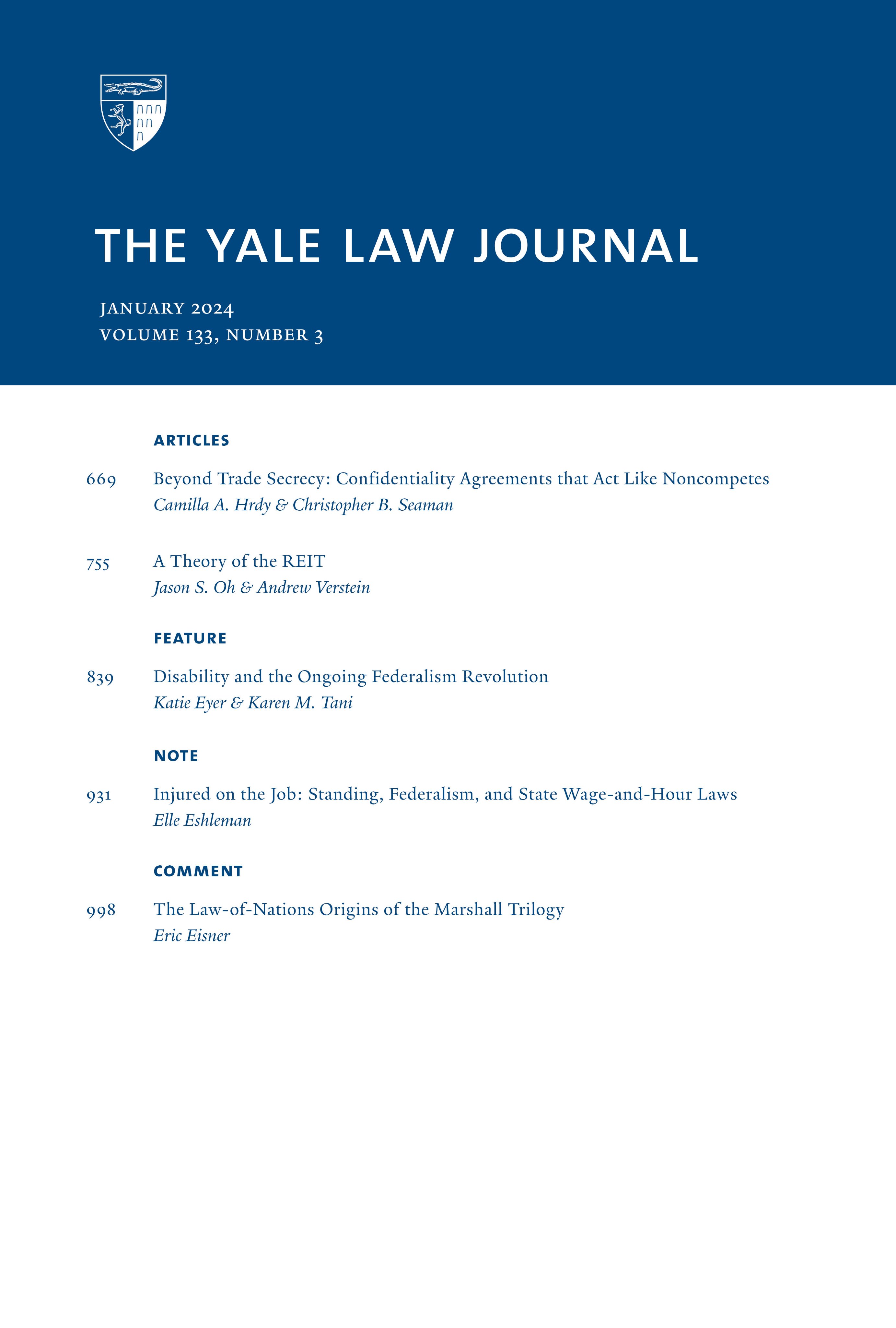Clearing the Smoke from Philip Morris v. Williams: The Past, Present, and Future of Punitive Damages
IF 5.2
1区 社会学
Q1 LAW
引用次数: 8
Abstract
In Philip Morris v. Williams, the Supreme Court held that the Constitution does not permit the imposition of punitive damages to punish a defendant for harm caused to third parties. This Article critiques the reasoning, but seeks ultimately to vindicate the result, of this landmark decision. It argues that, although the Court's procedural due process analysis does not stand up to scrutiny, punitive damages as punishment for third-party harm do indeed violate procedural due process, but for reasons far more profound than those offered by the Court. To reach that conclusion, the Article confronts the most basic and fundamental questions about punitive damages - questions that the Supreme Court has studiously avoided for more than a century: what, exactly, is the purpose of punitive damages, and how is it constitutional to impose them as a form of punishment in a judicial proceeding without affording the defendant the protection of the Constitution's criminal procedural safeguards? The Article argues that punitive damages are properly conceived of a form of punishment for private wrongs: judicially sanctioned private revenge. As such, the Article explains, it makes both theoretical and doctrinal sense to impose them without affording the defendant criminal procedural protections, which are necessitated only for the punishment of public wrongs on behalf of society. When, however, courts employ punitive damages as a form of punishment for public wrongs, they become a substitute for the criminal law and thus make an intolerable end run around the Bill of Rights. For that reason, Williams was ultimately correct that punitive damages must be limited to punishment for the harm done to the individual plaintiff, not the harm done to the general public. The Article concludes by considering the future of punitive damages in light of the Williams decision. It concludes that, contrary to the emerging conventional wisdom, Williams does not stand in the way of the imposition of substantial extra-compensatory damages of the type favored by law and economics scholars as a means of forcing the defendant to internalize the costs of its behavior in order to achieve optimal deterrence. It is the fact that punitive damages punish, and that they do so in order to vindicate the interests of the state, that precludes their use to address third-party harms. Once the element of punishment is eliminated from the remedy, the constitutional infirmity at issue in Williams is ameliorated.菲利普·莫里斯诉威廉姆斯案:惩罚性赔偿的过去、现在和未来
在菲利普莫里斯诉威廉姆斯案中,最高法院认为,宪法不允许对被告施加惩罚性损害赔偿,以惩罚其对第三方造成的损害。本文对这一具有里程碑意义的决定的推理进行了批评,但最终试图证明其结果是正确的。它认为,虽然法院的程序性正当程序分析经不起推究,但惩罚性损害赔偿作为对第三方损害的惩罚确实违反了程序性正当程序,但其原因远比法院提出的更为深刻。为了得出这一结论,该条面对了关于惩罚性损害赔偿的最基本和最根本的问题——最高法院一个多世纪以来刻意回避的问题:惩罚性损害赔偿的目的究竟是什么?在不向被告提供宪法刑事诉讼保障的情况下,将其作为一种惩罚形式强加于司法程序中,这如何符合宪法?本文认为,惩罚性赔偿是对私人过错的一种惩罚形式:司法认可的私人报复。因此,该条解释说,在不向被告提供刑事程序保护的情况下施加这些惩罚,在理论上和理论上都是有意义的,只有在代表社会惩罚公共错误时才需要刑事程序保护。然而,当法院采用惩罚性损害赔偿作为对公共过失的一种惩罚形式时,它们就成了刑法的替代品,从而绕过了《权利法案》,使人无法容忍。因此,威廉姆斯认为惩罚性损害赔偿必须限于对原告个人所受伤害的惩罚,而不是对公众所受伤害的惩罚,这一观点最终是正确的。文章最后根据威廉姆斯案的判决考虑了惩罚性损害赔偿的未来。它的结论是,与新兴的传统智慧相反,威廉姆斯并不反对法律和经济学学者所青睐的那种强制实施实质性的额外补偿性损害赔偿的方式,这种方式可以迫使被告将其行为的成本内在化,以实现最佳威慑。惩罚性损害赔偿是一种惩罚,而且是为了维护国家利益,这就排除了使用惩罚性损害赔偿来解决第三方损害的可能性。一旦从救济中消除了惩罚的因素,威廉斯案中争论的宪法缺陷就得到了改善。
本文章由计算机程序翻译,如有差异,请以英文原文为准。
求助全文
约1分钟内获得全文
求助全文
来源期刊

Yale Law Journal
LAW-
CiteScore
4.50
自引率
6.20%
发文量
0
期刊介绍:
The Yale Law Journal Online is the online companion to The Yale Law Journal. It replaces The Pocket Part, which was the first such companion to be published by a leading law review. YLJ Online will continue The Pocket Part"s mission of augmenting the scholarship printed in The Yale Law Journal by providing original Essays, legal commentaries, responses to articles printed in the Journal, podcast and iTunes University recordings of various pieces, and other works by both established and emerging academics and practitioners.
 求助内容:
求助内容: 应助结果提醒方式:
应助结果提醒方式:


